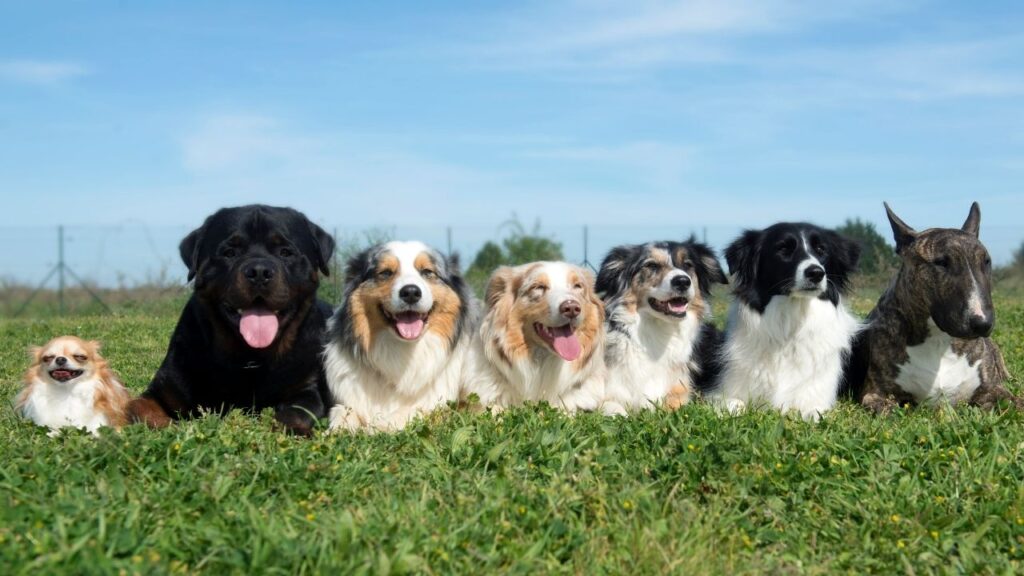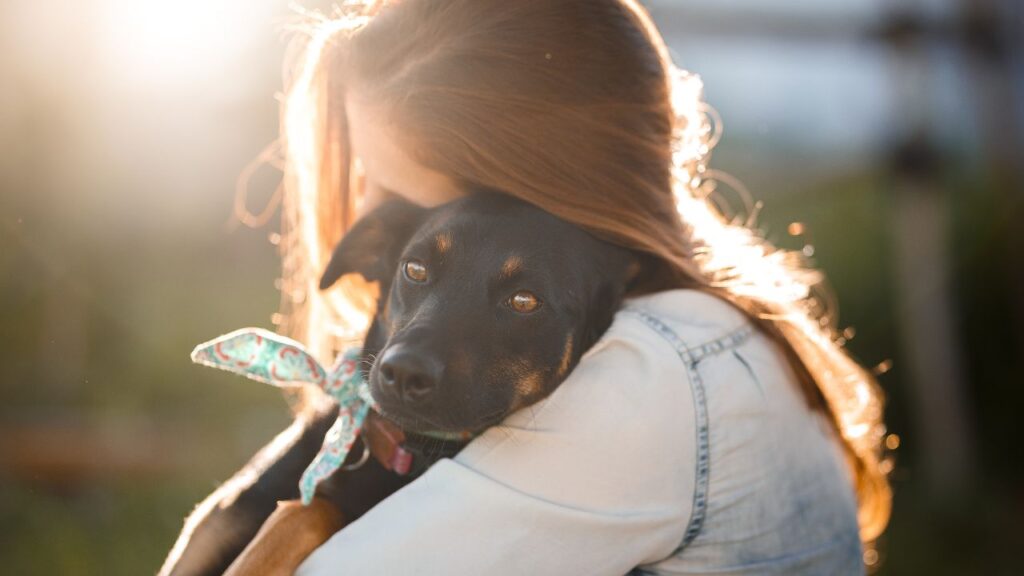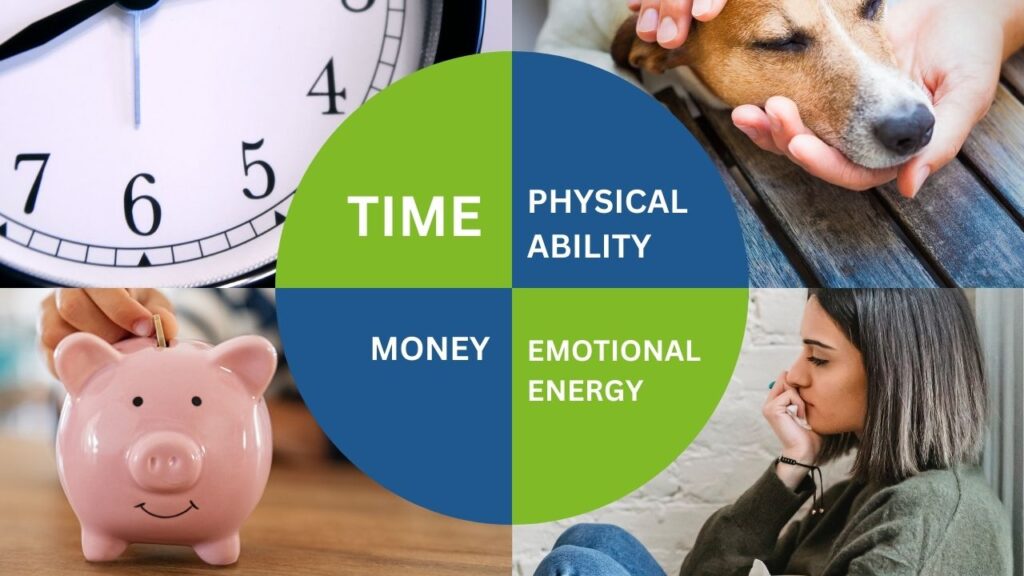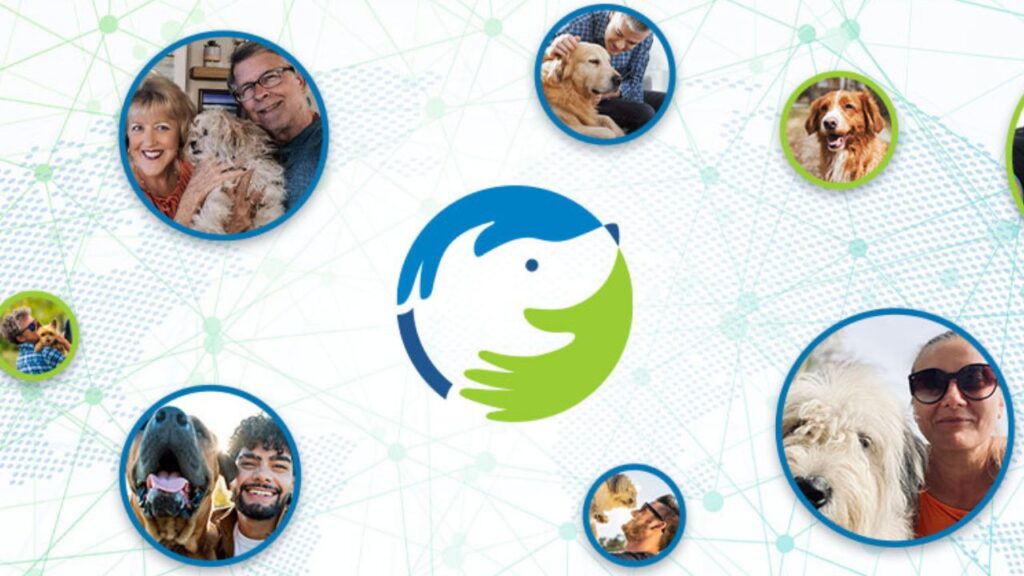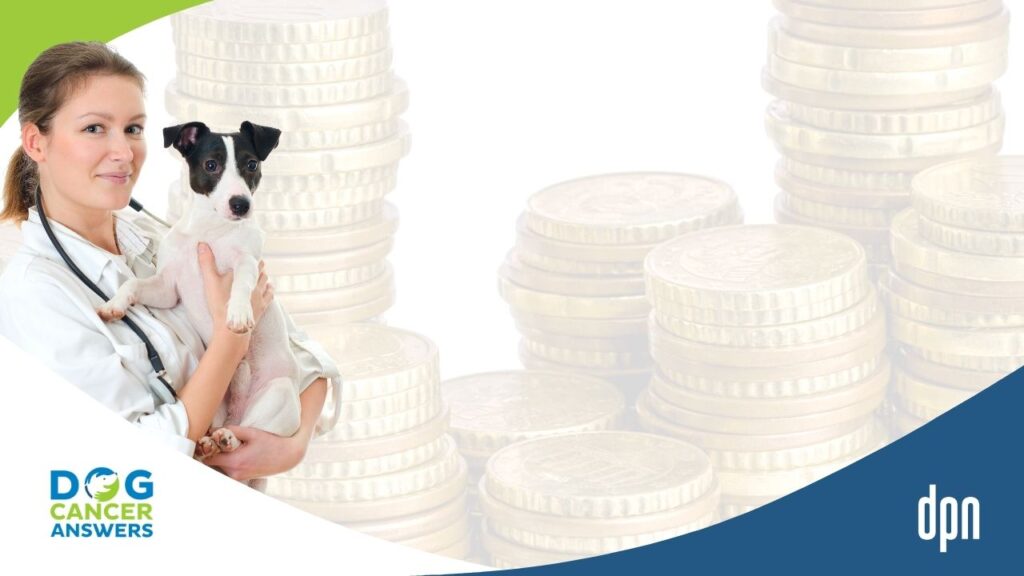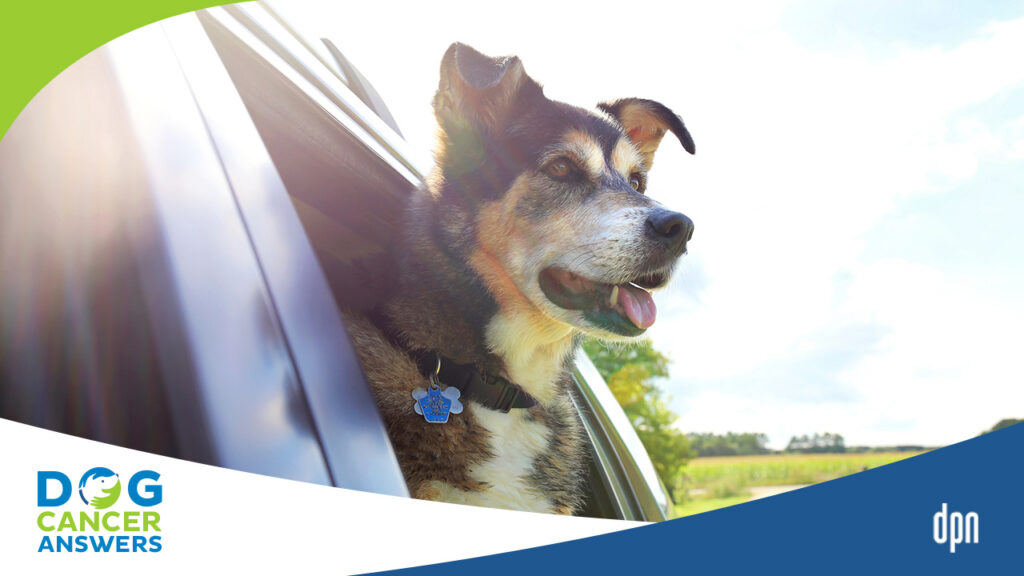EPISODE 232 | RELEASED November 13, 2023
Arguing About Dog Cancer | Jeannine Moga
Just realized you and your spouse or significant other dramatically disagree on how to handle treatment or euthanasia decisions? Today’s guest has tips.
SHOW NOTES
Sometimes you only find out you and your partner have dramatically different perspectives after disaster strikes. It’s hard enough to cope with a dog cancer diagnosis on your own; when you also fight with your most important person, the trouble triples.
Social worker Jeannine Moga has spent fifteen years in veterinary hospitals helping animal lovers with difficult decisions of all kinds, from how to handle veterinary expenses to when to choose euthanasia.
Host Molly Jacobson is joined by special co-host (and her husband) James Jacobson. They discuss tough times and how to handle them with wise help from Jeannine Moga. Listen (above) or watch the video version, below, or scroll further down the page to find the transcript for the podcast.
Links Mentioned in Today’s Show:
How to Meditate with Your Dog by James Jacobson is available in audiobook: https://www.audible.com/pd/How-to-Meditate-with-Your-Dog-Audiobook/B0095YSGRG
Podcast about How to Be There for Your Dog at the End with Lori Levine on The Long Leash https://www.youtube.com/watch?v=z6Fz8IJaqzM
Podcast about moral injury with Dr. Nathan Peterson: https://www.youtube.com/watch?v=mD6h1xvMxFQ
Podcast about How to Think About Dog Cancer Expenses with Dr. Lauren Barrow: https://www.youtube.com/watch?v=EMH4VNBGcSk&t=667s
Podcast about How to Know When to Euthanize Your Dog with Dr. Demian Dressler: https://www.youtube.com/watch?v=7dj7ajAPhL0
Article about Meet the Heroes Who Fight Dog Cancer Without a Veterinary License https://www.dogcancer.com/articles/building-your-team/meet-the-heroes-who-fight-dog-cancer-without-a-veterinary-license/
Article with Questions to Ask Your Vet About Dog Cancer https://www.dogcancer.com/articles/building-your-team/questions-to-ask-your-vet-about-dog-cancer/
The Dog Cancer Survival Guide: Full Spectrum Treatments to Optimize Your Dog’s Life Quality and Longevity by Demian Dressler, DVM and Susan Ettinger, DVM, Dip. ACVIM (Oncology) is available everywhere books are sold and on https://dogcancerbook.com
Our dog cancer support group is on Facebook at https://facebook.com/groups/dogcancersupport
>> Jeannine Moga: The human brain is really good at going to catastrophe in times of high stress because that is protective. However, it’s not always accurate or functional.
>> Announcer: Welcome to Dog Cancer Answers, where we help you help your dog with cancer.
>> Molly Jacobson: Hello, friend. I’m Molly Jacobson, and today we’re talking about a very tender topic, how to help you and your loved ones have tender discussions around tender dog health care topics.
And joining me today for this conversation is someone who knows a lot about tender dog health topics and discussing them with his partner, my husband, James Jacobson, founder of Dog Podcast Network.
>> James Jacobson: It’s great to be with you, Molly. And yes, tenderness, this is actually a really important subject, and I’m so glad that you invited me to participate because this is a critical conversation that families have to get in alignment on.
>> Molly Jacobson: Absolutely. To help us with this conversation, I spoke to another expert, an actual expert with letters after her name. MSW are the letters, which stands for Masters of Social Work. I spoke with Jeannine Moga. She spent about 15 years. at veterinary hospitals, helping families have these tender discussions and here’s what she has to say about her background.
>> Jeannine Moga: I spent about 15 years actually in university veterinary hospitals and so worked very closely with oncology teams and radiology teams and emergency room teams as they were helping to guide animal people through really difficult decisions so that hopefully we can get people to land in a space where they feel very comfortable and confident in what they’ve chosen.
>> James Jacobson: Well, that sounds like very difficult work, and it sounds like it’s also really important work, Molly. I mean, we all know firsthand how difficult it can be to deal with these types of decisions when it comes to dog cancer.
>> Molly Jacobson: Yes, and isn’t it amazing to think about going to a veterinary hospital and having an actual social worker on staff who’s available to have a conversation with you? I think every veterinary practice needs that. I, I bet there’s a lot of veterinarians listening right now who are like, Oh, wish I could do that.
>> James Jacobson: I love that. I think when you, when you booked Ms. Moga, I was really excited that I didn’t know such a thing existed, ’cause obviously when you go to the hospital and you’re dealing with, you know, just a small surgery, much less something serious and dire like dog cancer, that you’re assigned a social worker.
So this is a really cool thing. And I wonder if this is going to be a trend in veterinary medicine.
>> Molly Jacobson: Yes, I wonder, because it’s so needed, right? It’s so difficult to, I think some couples sort of find out that they disagree on very important topics in moments of crisis, right?
>> James Jacobson: Right. Well, we have different perceptions, right? You know, we don’t always agree on when it comes to what to have for dinner.
>> Molly Jacobson: Right. Can you think of any time in our life when we have maybe had a disagreement on how to treat a dog? What steps to take?
>> James Jacobson: Are we recording a podcast?
>> Molly Jacobson: We are recording a podcast.
>> James Jacobson: Absolutely. We had to deal with first hand discussions related to pretty much every dog that was really critically ill and how to deal with that, and luckily we kind of are both You know came to the same conclusion, but we had perhaps different perspectives to get there and it’s a difficult conversation And so I’m really glad that we’re able to frame it through this conversation here.
>> Molly Jacobson: Yeah, it’s a difficult subject. And then you have very different perspectives. And sometimes it seems like you’ve much more different perspectives until you get down and lay it all out and understand each other really well. And that’s what Jeannine Moga is so good at doing and helping people with.
First, I wanted to play you just a little bit of something that she said about differing perspectives and why it’s important just to start from that baseline. That we need to understand, everybody looks at things differently. So, here’s Jeannine Moga.
>> Jeannine Moga: People perceive things differently. They just understand the situation differently. It might also come from having very different needs. And sometimes those needs also reflect having a different relationship with the patient because not every member of a family is going to have an equally close relationship, equally bonded relationship with a family pet.
>> James Jacobson: That is certainly true when it came to the first dog that you and I had to deal with, Molly. Maui, who is a dog who I’d had for many, many years. You got to meet her in her very senior years. And she did not have cancer, but she, but she was way up there in age and had all sorts of attendant issues, which I write about in my book, How To Meditate With Your Dog.
>> Molly Jacobson: Right, right.
>> James Jacobson: And. It was an interesting conversation that we had, because, you know, I was basically, I’d spent so much of my bachelorhood days with this little dog that she was basically my, my child. And so I believe that Maui wanted to hold on forever. And you helped me see that, you know, maybe when a dog is 16, 17 years old, it isn’t always forever. And that was a very difficult thing for us to, to go through, but I’m glad that, uh, that we did. We resolve it. Yeah.
>> Molly Jacobson: Nature resolved it in part.
>> James Jacobson: Mm hmm. With a little assistance. I mean.
>> Molly Jacobson: With a little assistance from dad.
>> James Jacobson: When we had to put her down at the end.
>> Molly Jacobson: Yeah.
>> James Jacobson: But it was so obvious at that point
>> Molly Jacobson: Yes, and it was more obvious to me sooner and less obvious to you until like the day before, right? So that was, that, there were two different perspectives at play. And honestly, my perspective was I really loved Maui. I certainly loved you. And I didn’t like seeing either one of you suffering the way that you were suffering. But I couldn’t see Maui the way you saw her. And I had to be very, very careful not to overstep my bounds as Maui’s, you know, she liked me, but you were her person.
>> James Jacobson: She did? Maui did like you?
>> Molly Jacobson: Oh yes, she did.
>> James Jacobson: But I was her person.
>> Molly Jacobson: But you were her person.
>> James Jacobson: I let you feed her towards the end to make sure that she, that she, uh, realized that you were good.
>> Molly Jacobson: One of the ways I made friends with Maui is that I was the only one who fed her. Um, but yeah, that was, that was tough. And luckily we did align on the actual values. Like, we didn’t have any of those heartbreaking discussions that some people have of, like, one person, for example, is comfortable with euthanasia, doesn’t like it, but is comfortable with it, and someone else really is not.
Let’s listen to Jeannine Moga talk a little bit about what happens when there’s a source of conflict from a misalignment of values.
>> Jeannine Moga: Sometimes it’s because values are in conflict. So when we have big decisions come up in families, that’s when we’re really aware that not only might we be thinking about things a little bit differently, it might also be that this is where our slightly different or largely different value systems are coming into play.
>> James Jacobson: Of course, perception is, is one thing. And we can all understand people have different perspectives or perceptions about things, but there are certain things that, that feel even deeper and kind of like, you know, singed* *at the soul and those are feelings of guilt and Jeannine and you talked a little bit about guilt as well
>> Jeannine Moga: Because we are human and how our brains work is that we then instantly start to rewind because we’re asking how in the world did this occur? What did I not do or what did I do wrong that led to this? Because we’re just grappling with what is, let alone what we need to do to proceed.
And so just that grappling and trying to make sense of the things that don’t make sense takes so much energy and so much brain space that we can get really stuck there. And sometimes we don’t have the luxury of time.
>> James Jacobson: Oh, how true. You don’t have the luxury of time when you’re making some of these decisions that are so vital when it comes to what’s going to happen with your dog. And then you’re dealing with the conflict and the families and it just gets, you know, a little complicated, which is where you want to reach out for some support. And oftentimes that support comes in the form of the people at the vet clinic.
>> Molly Jacobson: Absolutely. Because oftentimes you’re trying to figure out what is happening and you’re feeling guilty that your dog has cancer. You’ve got all these emotions crashing down on you and you have to make a decision at this moment, like in a case of hemangiosarcoma, your dog’s bleeding out, do we do the surgery or not?
It’s really, really stressful. There are some other really urgent illnesses where you’re making a decision in the moment. You’re spiraling. It’s terrible. So this is where we get into sort of the advice section. The first piece of advice that Jeannine Moga has for us is don’t shoot the messenger, that your veterinarian and their staff are on your side.
Let’s listen.
>> Jeannine Moga: Your veterinary team, your family veterinarian, the emergency room team, those folks are incredibly invested in companioning people and their pets through these really difficult situations. And they want you to understand your options. They want you to understand as best you can the hows and the whys so that you can then move to what is next.
And in the moments when these diagnoses are delivered and they’re so shocking, those moments can also be really time pressured for veterinary staff.
>> Molly Jacobson: So you’re a veterinarian and the staff, they’re in a terrible position, right? I mean, I often think about this. Obviously, we talk to dog lovers all the time. We completely are dog lovers. We’re not medical professionals, so we completely understand that side of the table. And on the other side of the table, they’re delivering the worst news possible, almost, but really bad news.
They know that you’re being hit like a ton of bricks. And there’s a patient who’s been waiting for 10 minutes in the next room.
>> James Jacobson: Right. And then there’s a wellness check for another dog and they have so many conflicting things. And so it’s easy for us to think, my God, they’re not giving the attention to my dog that deserves their undivided attention. And you do pretty much get their undivided attention when they’re in the room with you treating your animal.
But they have so many other things to do and that’s where you and, and that’s kind of what we do here at Dog Cancer Answers and a DogCancer.com.
>> Molly Jacobson: Right.
>> James Jacobson: That’s where you have to step back.
>> Molly Jacobson: That’s why we’re here. It’s to be there for you
>> James Jacobson: Exactly and take a step back and you and Jeannine talked a little bit about taking a step back and getting that perspective.
>> Molly Jacobson: Yes.
>> Jeannine Moga: Then I encourage clients to go back home, sort of, wrap your head and your heart around what is happening. Write down all of your questions and then put a star next to the top three or five and then set up a time to talk to your veterinarian. Make a follow up phone appointment or a follow up in person appointment and take the list.
>> James Jacobson: I would probably elaborate three or five. I’d get down all the questions and some of the questions you may be able to find out on DogCancer.com, but then obviously things that are specifically related to your dog is where you want to talk, you know, to your veterinarian and get their perspective because it’ll make the conversation a little bit easier.
They won’t feel like they have to spend an hour or two on the phone or an appointment with you. And then they will be able to, you know, talk about the salient information based on their observations and their tests. And they may, they may suggest that you get a second opinion. Everything depends upon the specifics of your own dog’s case.
>> Molly Jacobson: Exactly.
>> James Jacobson: Let’s take a break right here and get back to the conversation in a moment. We will be right back.
And we are back.
>> Molly Jacobson: So the next piece of advice that Jeannine Moga had was about note taking.
>> Jeannine Moga: When we take notes in some form, as we are having information shared with us, it does help our brains to organize it and remember it a little bit more successfully. And when someone is sharing information with us about fairly complicated things, it’s really easy for us to get overwhelmed and scrambled, especially because so much of what’s happening is emotional.
So writing it down helps us to recall it later. Helps us to organize our thoughts when we’re trying to make decisions.
>> James Jacobson: Pretty good advice. Write it down, and you do that.
>> Molly Jacobson: Oh, yes, I do. I write it down. I dictate into my phone. I make to dos. I absolutely am the master note taker. Otherwise, I don’t remember anything, and that’s true all the time, let alone when my brain is under stress.
Another great suggestion that Jeannine Moga had was to take a trusted friend, and I can personally vouch for this, even just the offer of having somebody offer to come to a veterinary appointment for me, especially with Roo in one particular instance, when you couldn’t come, having my friend offer to come with me was really helpful.
So let’s just hear a little bit from Jeannine Moga about why a support person is so important.
>> Jeannine Moga: The human brain is really good at going to catastrophe in times of high stress because that is protective. However, it’s not always accurate or functional. So if you have the option to take a support person with you to these appointments, do it.
A friend, a family member who you trust, who’s not going to insert themselves inappropriately. Remember, their job is to support. It’s not to judge. It’s not to tell you what to do. It’s to be there to support you because you need to have someone in your corner. Because these are really, really emotionally intense moments.
>> James Jacobson: Okay, so you bring your friend, Diane or whoever, to the appointment and you get more information and you’ve written everything down. Now, it’s time to go back to your family where the real conversations are going to happen, where the real rubber meets the road. How do we make a plan going forward now that we know what we need to do?
Jeannine had some good advice about that.
>> Jeannine Moga: So if we can get all of that on the table and then start to compare. We can see then where we have different perspectives. Can we reach a shared understanding? And, and what I often will say to family members is, where are there enough similarities that you can put that in the middle of the room?
Because that’s where we build a common ground. We’re not going to necessarily agree on everything. But can we agree on some things? Let’s begin there. And we work back from that place.
>> James Jacobson: We can’t agree on everything, but can we agree on some things? That sounds like an awfully good place to begin the conversation at home.
>> Molly Jacobson: Yes. I mean, there’s been books about negotiations written called like Getting to Yes, right? Like you get to yes by getting a small yes. Like, can we agree on something? Like, can we agree on one thing together? A really good place for people, I think, to start would be, can we agree that we both love Fluffy? Right? Because that’s usually a yes.
>> James Jacobson: Right. Okay. We both love the dog. You love him a little bit more. But yeah. We, we both love Fluffy. Yeah.
>> Molly Jacobson: I’m sure there are conversations that have gone that way. But most of the time, people say yes. We can both agree.
>> James Jacobson: Right.
>> Molly Jacobson: We both love the dog. And then you can get into other areas. And one of the other areas that you might get to is finances, because especially these days, right, like, money is tight and tight and tight. So, financial disagreements. Jeannine Moga had some suggestions.
>> Jeannine Moga: We make a lot of difficult decisions every day and they don’t feel good. Thinking that we’re going to make decisions about cancer treatment, even palliative care without factoring in finances is unrealistic.
>> James Jacobson: We talk a lot about finances on DogCancer.com and we will have some links in today’s show notes to those articles and those conversations. We’ve also covered it on Dog Cancer Answers. And we’ll also link to those episodes because finances is a critical thing that so many people have to deal with when they’re dealing with dog cancer.
>> Molly Jacobson: Yeah, and disagreements around finances exist in the best of partnerships and, and families. And those whatever disagreements you’ve already had about finances can be multiplied exponentially when you’re trying to decide how much or how to spend money on cancer care for your dog. So that’s a really important topic. And mainly she says, don’t ignore it. And the other topic that she doesn’t want you to ignore is euthanasia.
>> James Jacobson: That is one that, unfortunately, will probably enter the picture in way too many cases of dog cancer. And perhaps even in what you’re looking at right now. Here’s Jeannine Moga.
>> Jeannine Moga: End of life decisions are also Incredibly charged all of the time and this is where too we have to engage that same set of questions that we engage when we’re trying to solve a conflict about whether to treat or not or what kind of treatment to choose. We also have to engage the same set of questions about end of life care.
So what do you understand? What are you afraid will happen if we do this versus if we do this? What do you not want our dog to experience? What is not okay for them? What is not okay for us? And because euthanasia is so final and is also the kind of power none of us wants to hold.
It is incredibly uncomfortable to think that we have control over someone else’s dying process. That is part of why those end of life decisions are so incredibly challenging.
>> James Jacobson: So true And I know we deal with this almost on a daily basis when we engage in our community with people having to deal with euthanasia and there’s again a lot of information a lot of advice on our website, DogCancer.com. We’ve had to deal with it. Sometimes it is It’s painful. And even though you’re really, really well prepared, you just don’t know what’s going to happen. And then sometimes it can be one of the most beautiful things ever. And, um, we, we talk about that.
Actually, there’s a podcast on, um, I think The Long Leash that I did. We’ll put a link to that in the show notes that talks about one of these most transformative, wonderful experiences through that transition, but having those conversations at home because it does involve morals and it does involve things that you generally don’t talk about with people is such a powerful thing and can divide people on religious and moral and ethical grounds and it’s important to really understand this because this is an important step, but it can also be very beautiful.
It’s why we have so much information on that subject.
>> Molly Jacobson: Yeah, because it’s a complex and horrible and sublime subject all at the same time. Jeannine Moga also pointed out, though, that beyond the individual experience, it can also create what’s called a moral injury, depending on the person. Let’s listen to what she has to say about moral injury.
>> Jeannine Moga: Moral injury is when we are being asked or proposed to do something that actually doesn’t align with our values. And we internalize, our values are part of who we are as humans, and they’re part of our identity. And so we deeply feel that there’s a level of pain that is caused by a moral injury That is deeper than any other kind of strain.
>> James Jacobson: You actually had a conversation with a veterinarian about that not too long ago.
>> Molly Jacobson: Dr. Nathan Peterson. i’ll put a link in the show notes. He talked about his research into moral injury in the veterinary profession when they have to do things in their work that doesn’t feel like it’s in the best interest of the animal they’re treating. And it was a really, honestly, very sad discussion, but also deeply, deeply moving.
And I think it gives a really good perspective for not just about the veterinary side of things when it comes to euthanasia, but also about what some people truly struggle with. We have people in our group every day who genuinely struggle with the idea that they are taking control over their dog’s life and that they’re making a decision to end it.
It feels like murder to them. And it’s really It’s really when that is the case, and you can’t wrap your mind around it any other way, or reframe it for yourself, it’s just very painful. So it’s important, I think, for us to acknowledge that in some instances, that’s what it feels like, and it’s a very serious subject beyond the obvious pain and loss of losing your dog.
>> James Jacobson: There’s so many things that you feel and you may feel for the very first time or with great intensity when you’re dealing with, with dog cancer. And you and Jeannine talked a little bit about that and the fact that really there are no bad feelings.
>> Jeannine Moga: Not all feelings feel good, but there’s no bad feeling. They’re all valid. Feelings are there to tell us something. That’s the function of an emotion in the brain. What is this telling me? Why am I so angry? What is so frustrating about this situation for me right now? Is it something I can influence or control? Take a good deep breath, and if that’s not enough, step away and take many more.
Because breathing and slowing our breathing is one of the best tools we have to, as I call it, get back into our eyeballs. We have to slow everything down, so the power of the pause is, it’s something I can’t say enough. It’s incredibly important for us to slow down ourselves and the process. To ask ourselves, what is it I need right now, even if it’s that I need to go step away and sit in my car for a couple of minutes.
>> James Jacobson: Dr. Dressler talks a lot about that subject in the Dog Cancer Survival Guide.
>> Molly Jacobson: Mm hmm. Deep breathing helps to calm you down and help you sleep and help you think and help you just cope with all of it. Little Chloe is doing some deep breathing right now
>> James Jacobson: She’s all of a sudden wanted to be a part of this podcast.
>> Molly Jacobson: Yes for those.
>> James Jacobson: This is Chloe everyone.
>> Molly Jacobson: For those who are listening you can’t see it. But anybody who’s watching us on YouTube, this is Chloe. Hello, Chloe.
>> James Jacobson: Is this her debut on Dog Cancer Answers?
>> Molly Jacobson: This might be her debut on Dog Cancer Answers.
>> James Jacobson: She’s appeared on other shows on the Dog Podcast Network, but this is her first debut.
>> Molly Jacobson: She said I like to be there for the tender discussions Um, yeah, I was thinking a lot about Dr. Dressler’s emotional management exercises in chapter two of his book throughout the entire conversation with Jeannine Moga, because I think one of his main points is that you’ve got to calm down because you are the leader. No one else knows your dog the way you do, and no matter what options are being presented to you, it’s your decision whether to take them or not.
So you need to own the situation, and that starts with owning where you are, and really knowing what’s going on for you. And she talked a little bit about that.
>> Jeannine Moga: Just calling it. I’m sorry. I am really getting upset. This is more than I can take in and I’m doing the best I can. And I can tell you’re working really hard right now as well. And I feel like we’re not making any progress here. And you know what? When we call that out to another person, sometimes they find that to be a great relief because sometimes they’ll go, Oh, thank you.
I’ve done that with my own vet. Actually I said, I’m sorry. I feel like I’m, I’m asking all the wrong questions and I’m not making any sense and I’m using all the wrong words and I’ve had her actually say, Oh, no, no, no, it’s okay. I totally, I get it. We’ll take all the time you need, but by me just owning where I am, that helps. It helps them to know where I am.
>> James Jacobson: Another subject that you and Jeannine talked about is the subject of anticipatory grief.
>> Molly Jacobson: Yes, anticipatory grief is often very surprising for people whose dogs get cancer. They’re overwhelmed by the thought of their dog dying. And so they start to grieve as if it’s already happened, and it’s a totally normal thing that happens. It’s actually really common with dog cancer that people first even understand it as a concept. All of a sudden they’re terribly sad, their dog’s still alive.
And they’re looking at them and all they can think about is eventually this dog is going to die. And it’s just really difficult to deal with. Jeannine Moga actually spoke about this with me and she explained her own anticipatory grief when her dog got hip dysplasia, which is obviously a chronic condition. It is not a death sentence in any way, but she was hit with anticipatory grief.
>> James Jacobson: Let’s listen.
>> Jeannine Moga: That was certainly not life threatening. It was quality of life impact, but it wasn’t life threatening. And I was launched into this anticipatory grief process that came out of nowhere over something like that, right?
So the grief can come out of the blue, and it’s because we are sometimes really aware that life is precious and fleeting. And so it doesn’t always take much to get us there. So it comes up all of the time and it will become a constant companion the moment there is a diagnosis like cancer. Allow it to be there.
And grief is also a tangible reminder of the depth and breadth of love. And so we have to learn to live with it as the companion for this deep love that we have for our animals.
>> Molly Jacobson: So I really loved that point that Jeannine was making that the depth of your grief reflects the depth of the love that you share with this dog, and that, in a way, its intensity is a signal to you of how much you care and how important this relationship is to you.
And that sort of begs the question in my mind, especially when I talk to people, for example, in the Dog Cancer Support Group, they’re talking to people who aren’t animal lovers about their dogs with cancer, and they’re shocked by the dismissive attitude. Now, obviously, I think that is shocking with them. On the other hand.
>> James Jacobson: We’re dog people though.
>> Molly Jacobson: Right? Exactly. That, that there’s such a thing as the right person to process this kind of really intense grief with, like, this is an intense grieving situation and you should get the right kind of support. This is what Jeannine Moga has to say about that.
>> Jeannine Moga: So in whatever way we can find support so that even in our unique grief experience, we feel like there’s someone else who can hear it because at the end of the day, we’re the only ones who can hold it. That’s the 2 a. m. scenario, right? It’s the grief that keeps us from sleeping. No one else can bear that in the middle of the night but us.
But if we can find others who can hold the space for it and hear our stories without judgment, without interrupting, without fixing, then that is what can help us walk through that process.
>> James Jacobson: So, Jeannine’s been doing this for a long time, right?
>> Molly Jacobson: Right. 15 years.
>> James Jacobson: 15 years.
>> Molly Jacobson: She’s been working in veterinary hospitals for around 15 years. Yeah.
>> James Jacobson: But not specifically as a social worker.
>> Molly Jacobson: Yes.
>> James Jacobson: As a social worker.
>> Molly Jacobson: Yes.
>> James Jacobson: So with, with that long history, did you ask her like to sort of sum it up in like her great pearls of wisdom?
>> Molly Jacobson: Yes, I did.
>> James Jacobson: Of course you did.
>> Molly Jacobson: And I think you’ll like what she has to say.
>> Jeannine Moga: I really believe that this too, as painful as these circumstances and situations are, that this too is a gift. And we can get really caught in the undertow of the complexities of these decisions, the complexities of cancer treatment, caring for a loved one who is in the sunset of their life, is a privilege, a profound privilege. And so remember to be mindful and to be present.
Do whatever it takes to stay in that space. To really just be grateful for every single moment we have, because every moment is stolen, whether we know they have a chronic or terminal disease or not. So being grateful and mindful and present is critical, and that doing it well, which is to say doing it aligned with our hearts and our minds, with the best of ourselves, is the best we can do, and that is enough.
>> James Jacobson: Wow. I do love that. That is beautiful advice. And it’s sort of the attitude of gratitude to sound like a Hallmark card. But it is a gift. It’s a profound opportunity that, probably you, if you are listening to or watching this podcast, are dealing with. And that mind shift, that frame to be able to look at it as a gift, something that you will remember for so many years and to be able to look back on it with having no regrets because you’re getting the information.
You’re, you’re talking to the people, you’re bringing your friends into the clinic, you’re having these difficult, hard conversations with your family members and you’re all in it together. And so viewing this from that perspective totally is just one of these, like, knocks on the side of the head that can make such a difference and, uh, not make you relish and enjoy the experience, but really appreciate it for its sacredness.
>> Molly Jacobson: Yes, I think that in some ways, dog cancer blows a hole in your life so that more light can come in, you know, the light from your dog’s love for you and once they do cross that rainbow bridge, rainbows are made of light. And I know for me, every time that I think about my dogs who’ve passed, I feel like they’re all in the room with me.
And there’s, there’s something about going through these intense times with others, whether they’re humans or animals, that can make us better, more whole, more healed people. And that is the opportunity. When you’re having these terrible and difficult discussions, that’s the ultimate opportunity, and I want to thank you, Jim, for having this discussion with me today.
>> James Jacobson: Well, thank you for roping me into this. I wasn’t expecting to do this today, but I am delighted because it is such an important conversation and, uh, if you enjoy hearing Molly and me together, let us know, maybe, maybe we’ll do more of these things if you want.
>> Molly Jacobson: Yeah, that would be nice. Thank you, listener, for joining us and for participating in this discussion in your own way and with your own people.
And remember to follow us on the socials. Remember to like us on Facebook and sign up for Dog Cancer News at DogCancerNews.com. Go to DogCancer.com for all of the information you need. We’re building more and more every day. Don’t forget if you have a question for one of our veterinarians, call our listener line at (808) 868-3200, and we will possibly use your recording for a future show.
Even if your question is not one you have for your current situation. But you know that it would make a great show and help a lot of other people, please call because those questions are sometimes the best. The ones that come from your heart, just donating your voice so we can make a show with it. Really appreciate those.
I’m Molly Jacobson.
>> James Jacobson: I’m James Jacobson. On behalf of all of us here at Dog Podcast Network, we want to thank you for joining us today. Take care and give your dog a big hug and we wish you…
>> Molly Jacobson: And your dog a warm, Aloha.
>> Announcer: Thank you for listening to Dog Cancer Answers. If you’d like to connect please visit our website at DogCancer.com, or call our listener line at (808) 868-3200. And here’s a friendly reminder that you probably already know, this podcast is provided for informational and educational purposes only.
It’s not meant to take the place of the advice you receive from your dog’s veterinarian. Only veterinarians who examine your dog can give you veterinary advice or diagnose your dog’s medical condition. Your reliance on the information you hear on this podcast is solely at your own risk. If your dog has a specific health problem, contact your veterinarian.
Also, please keep in mind that veterinary information can change rapidly, therefore, some information may be out of date. Dog Cancer Answers is a presentation of Maui Media in association with Dog Podcast Network.
Hosted By
SUBSCRIBE ON YOUR FAVORITE PLATFORM
Topics
Editor's Picks
CATEGORY



